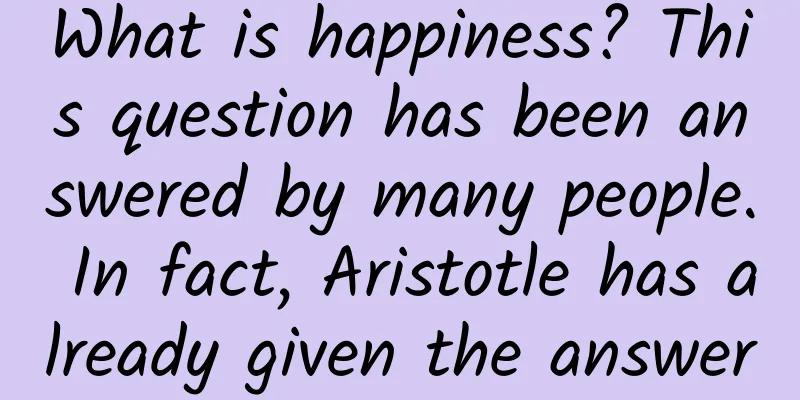What is happiness? This question has been answered by many people. In fact, Aristotle has already given the answer

|
© The Collector Leviathan Press: Whenever we talk about happiness, we always feel that we are trying to sell chicken soup for the soul to people, but this is not the case. Strictly speaking, happiness is the core issue in classical ethics and a basic issue that modern ethics cannot avoid. Spinoza's "Ethics" advocates that looking at things from an eternal perspective is the path to happiness (love for God's wisdom). Russell's "Happiness" emphasizes that people should shift their attention to what they are interested in and live with a positive attitude. Jealousy makes people feel unhappy, so please don't compare yourself with others. The ancient Chinese also had the motto "Everything in the world is like a blessing in disguise" to measure the standard for identifying happiness. Mr. Chen Jiaying published a book titled "What is a Good Life" a few years ago. Students who are interested can take a look at it. Many people say they are searching for happiness. They spend a lot of time and resources searching for the secret of happiness like miners in the past searched for gold. But for some wise men throughout history, this approach is wrong. Happiness is not to be found, but to be attracted. Perhaps the most famous proponent of the latter view was the ancient Greek philosopher Aristotle. He defined happiness as “eudaemonia,” meaning “good mind.” To modern ears, this may sound a bit illusory, like the superficial feeling of happiness that many people (wrongly, in my opinion) pursue. Instead, the happiness the philosopher refers to is a divine state that comes to each of us in due time. Our only responsibility is to open the door to it; and we can achieve this by living a good life. To live a good life, we should practice specific virtues and make them habits. As Aristotle wrote in his Nicomachean Ethics, “It may be reasonably supposed that happiness is attained by one’s own efforts, and not by the gift of good fortune.” Here are ten virtues he suggested, and modern research shows that these virtues generally attract good hearts. © Douban Movies Courage Aristotle was talking about courage in the context of sacrificing one’s life, such as in war. In our modern context, it’s hard to guess whether he would have endorsed this virtue — who knows what he would have thought of the phenomenon of “cancellation” on social media? But the question here is not about the source of fear, but whether courage—acting in the face of fear rather than giving in—can lead to happiness. Research suggests it does[1]: Scholars have shown that courage can lead to resilience after adversity, which in turn leads to greater happiness. Temperance Here the philosopher was referring to self-control in the face of one's desires and base impulses. He would have seen the hippie motto "If it feels good, do it!" as a way to cause misery. Modern scholars who study self-control have similar views, but also different ones. © Wikipedia A 2017 study published in the Journal of Personality found that [2] college students’ impulse control gradually improved throughout the day, and positive emotions initially declined. However, as self-control continued to increase, negative emotions began to decrease; when self-control reached the highest level, happiness also reached the highest level. In other words, a little moderation is not good for happiness, but enough moderation can be a good thing. Liberality The philosopher isn't referring to "liberalism" in a political sense here, but to money . Specifically, he advises avoiding being stingy, but also not being spendthrift. In fact, there's evidence that being stingy can affect your happiness. © Ocean's Bridge For example, in 2014, three economists set up an “ ultimatum game” in which participants need to allocate a certain amount of money: one participant proposes a distribution method, and the other can choose to accept or reject it, but rejection means that both parties get nothing, so a bad distribution method may receive a malicious response. Researchers found [3] that when the negotiated allocation was less than 40%, both parties experienced higher levels of physiological stress (according to the “rational person” hypothesis, as long as the proposer allocates a small amount of resources to the responder, the responder should agree - because this is better than getting nothing. But actual experiments show that the proposal can only be passed when sufficient resources are allocated to the responder. Editor's note). Magnificence Related to generosity is what Aristotle called “nobility,” according to which a person “considers how his project can be carried out in the noblest and most glorious way, rather than how much it will cost and how it can be carried out cheaply.” He is not arguing here that the path to happiness is to buy a fancy yacht; rather, being noble means spending money on projects that benefit the general public. Today, we might call this “generosity”—engaging in philanthropy in as generous a manner as possible. At this point, there is no doubt that helping others brings pleasure.[4] Greatness of soul According to Aristotle, a person with a great soul will act in a manner similar to his ancient Greek philosophical predecessor, Socrates, who was said to be "indifferent to good fortune and bad luck." This requires a noble mindset, not that you cannot distinguish between pleasant and unpleasant things, but that you are more focused on things in life that are deeper and more meaningful than temporary pleasures and passing troubles. © Psychology Today In fact, research comparing adolescents’ pursuit of happiness and their search for meaning suggests that the latter leads to greater happiness[5]. In other words, it might be more beneficial to step away from social media and read something like the Nicomachean Ethics. Gentleness The virtue of gentleness refers to the ability to be kind and to control one’s temper. This ability to control oneself is thought to lead to happiness. If this is true, then the opposite of gentleness, aggression, should reduce happiness. In one study[6], researchers asked participants to imagine someone they despised and then either imagine violent, malicious acts against that person or focus on neutral thoughts. They found that those who began to engage in their aggressive fantasies reported lower levels of happiness than those who maintained their gentle thoughts. Truthfulness about yourself Aristotle placed great value on honesty. He opposed “exaggerated pretense” and self-aggrandizement, but also self-deprecation. He advised us to seek a solid humility through which we can know ourselves and show others who we are—neither arrogant nor self-deprecating. This fits with general research on humility, which is associated with lower levels of neuroticism and depression, as well as a greater love of life. But it also aligns with research that links insecurity and excessive self-criticism to anxiety and sadness.[7] Equity This is a term that has gained much attention in our modern debates. It is often concerned with increasing fairness, with making up for past discriminatory treatment. It is clear that when people feel they have been treated unfairly, it reduces their happiness.[8] But Aristotle was referring to something quite different. © International Women's Day “The just man,” the philosopher wrote, “is that man who, by choice and habit… does not insist too much on his own rights, but is willing to accept a smaller share, even when the law is on his side.” He called this “a special kind of justice.” I could find no concrete empirical evidence for this proposition. However, it is almost certainly related to the next virtue. Forgiveness Aristotle spoke of the virtue of consideration for others. To modern ears, this may sound like politeness or sensitivity to other people’s feelings, but the philosopher’s advice is actually more subtle: be tolerant and forgiving of others’ faults. These suggestions have a lot of modern literature to support them. Almost every study on tolerance shows that consciously practicing tolerance and letting go of resentment can reduce symptoms of depression and anxiety.[9] © John Templeton Foundation Modesty In the modern world, modesty is often thought of as being similar to humility. But Aristotle defined it as the avoidance of shameful (however tempting) behavior, even in private. This understanding of modesty makes it similar to temperance, except that we should abstain from vices altogether, rather than being moderate in the face of base desires. However, he added a qualification: modesty can only be a virtue if “a good person knows that he would feel ashamed if he did so.” In other words, to be virtuous in avoiding a certain action, you must believe that the action itself is immoral. I personally have no moral qualms about alcohol, but I don’t drink, so by Aristotle’s standards, my not drinking is not a virtue. With this in mind, this kind of humility is actually a happiness strategy[10]: when people consciously take actions that they believe to be moral, their happiness increases and they even feel more meaningful about their goals; when they engage in unethical behavior, they experience the opposite. It’s been over 2,000 years since Aristotle proposed these virtues of happiness, but I believe they still serve as a handy checklist for living a good life today. Here’s a simplified checklist you might want to post on your fridge or at the bottom of your computer screen: 1. List your fears and face them. 2. Understand your desires and control them. 3. Don’t be stingy or spendthrift. 4. Give as generously as possible. 5. Focus more on transcendental things and ignore trivial matters. 6. Real power is being able to control your emotions. 7. Never lie, especially to yourself. 8. Stop fighting for your share. 9. Forgive others and tolerate their weaknesses. 10. Be clear about your moral values; follow them even in private. None of these rules are easy to follow. Making them habits is even harder. But the effort pays off—in a well-deserved sense of well-being. References: [1]www.researchgate.net/publication/259778922_Biological_contributions_to_well-being_The_relationships_amongst_temperament_character_strengths_and_resilience [2]onlinelibrary.wiley.com/doi/epdf/10.1111/jopy.12322 [3]journals.plos.org/plosone/article?id=10.1371/journal.pone.0108218 [4]www.journalppw.com/index.php/jpsp/article/view/4535 [5]www.researchgate.net/publication/364186853_Pursuing_Pleasure_or_Meaning_A_Cross-Lagged_Analysis_of_Happiness_Motives_and_Well-being_in_Adolescents [6]journals.sagepub.com/doi/abs/10.1177/0886260518812796 [7]www.tandfonline.com/doi/abs/10.1080/17439760801999461 [8]journals.sagepub.com/doi/pdf/10.1177/0956797611417262 [9]osf.io/8qzgw/ [10]www.science.org/doi/abs/10.1126/science.1251560 By Arthur C. Brooks Translated by tim Proofreading/Rabbit's Light Footsteps Original text/www.theatlantic.com/ideas/archive/2023/08/aristotle-10-rules-happy-life/674905/ This article is based on the Creative Commons License (BY-NC) and is published by tim on Leviathan The article only reflects the author's views and does not necessarily represent the position of Leviathan |
>>: Boneless fried chicken can not only be eaten, but also used to control foxes | Natural Trumpet
Recommend
With the same budget, which one will have better conversion rate between Douyin and Baidu?
Since 2016, when information flow entered the cou...
Revealing the marketing logic behind Ding Zhen’s becoming a top internet celebrity!
Recently, a young man from Litang, Ganzi, Sichuan...
Qualcomm & IHS Markit: 5G Economic Report
The latest research results show that global 5G i...
Jiayuan.com may be responsible for Su Xiangmao's death
Recently, the suicide of WePhone developer Su Xia...
Why do some people get diarrhea when they are nervous?
Planning and production Source: A Brief History E...
The "Stone Kingdom" is open! What is the origin of the shocking Shimao ruins?
On November 29, the Shimao Museum in Shenmu City,...
New breakthrough! The heaviest so far, scientists successfully observed for the first time →
Science and Technology Daily reporter Lu Chengkua...
Have you received any orders from Baidu AiPurchasing? Is Baidu Ai Purchasing effective?
Now many companies know that Baidu has launched a...
After being infected with the new coronavirus, in what situations do you need to go to the hospital?
In the face of the COVID-19 pandemic, many people...
How to run Python code on iPad?
In fact, it’s not just iPads, mobile phones can a...
Longmen Hot Stocks "Limit Up Special Training Camp" First Issue
: : : : : : : : : : : : : : : : : : : : : : : : : ...
Can myopia be reduced from 800 degrees to 100 degrees? The truth is different from what you think
Author: Jin Xin, Director of the Shouyang Myopia,...
In 2021, do brands still need to engage in private domain business?
Today, when traffic is not easy to acquire and re...
Does “cancer constitution” really exist?
Some time ago, a report about a 65-year-old woman...
What amazing skills do sea snails, known as “global travelers,” have?
Author: Liu Yi Source: Knowledge is Power Magazin...









